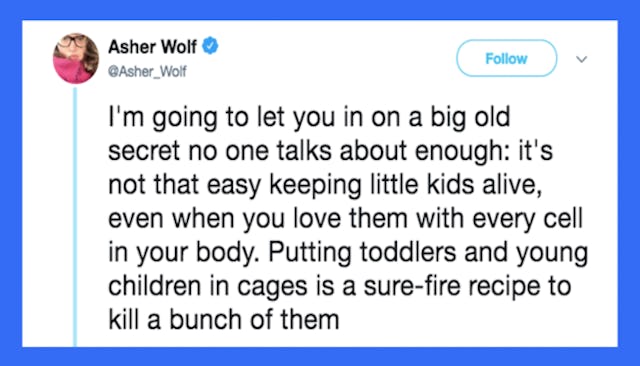Twitter Thread Nails The Heartbreaking Truth About 'Tender Age' Shelters And Sick Kids

‘Tent cities’ and ‘tender age’ shelters will result in children getting sick and potentially dying
Last night, we learned that babies and toddlers are among those being forcibly separated from their parents at the U.S.-Mexico border — and are being sent to what the government is calling “tender age” shelters. Currently, there are three of these shelters operating in South Texas. They’re just giant rooms of crying, traumatized children who desperately want the comfort of their parents.
So what happens when these babies and children get sick? Tossing them all together in hot, ill-equipped tents will undoubtedly lead to illness at some point. Who will bring them comfort? Who will ensure they receive medical care?
Twitter user Asher Wolf has some important, heartbreaking words on what these “tender age” shelters really mean.
Keeping children safe and healthy is a monumental, practically impossible task — even for parents who are ever-present. So what’s going to happen when these infants and toddlers can’t effectively communicate that they don’t feel well? While surrounded only by other terrified, strange children, government employees, and scary federal law enforcement agents with guns?
When my daughter was about 8 months old — the same tender age as many migrant kids in crisis as we speak — she developed Roseola. She was hot to the touch and covered in a rash from head to toe that left her in such discomfort from itchiness she thrashed her body around for hours to get relief.
Her congestion was so severe, no amount of snot-sucking could alleviate it. She refused to nurse, and she was growing dehydrated and weak. I spent hours on the phone with the after-hours doctor (because isn’t that when all major illnesses occur?), stripped her naked, bathed her in a lukewarm baking soda bath, and held her — still naked — wrapped up in a muslin blanket outside on our patio on a 55-degree April night.
It was the only way she could breathe and find cool, soothing relief from the rash. Her dad and I took turns rocking her outside until midnight.
Two weeks before Christmas last year, six weeks after her second birthday, my still-tender-aged daughter woke up from her afternoon nap and her entire body was scalding hot. Her eyes rolled in the back of her head and she was passed out before the thermometer could tell me her fever was already over 104. My husband was still at work, and I was home alone and terrified.
I didn’t wait for the doctor to return my call. We were at the local children’s hospital within the hour. My 53-year-old father choked back sobs while his only granddaughter screamed in fear of the doctor. She was still terrified even though she was with two people she loves, who love her more than life itself.
She wasn’t alone, huddled on a dirty cement floor, sitting inside a cage.
In both of these instances, she couldn’t tell me what was wrong. She relied on me to do the figuring out. To carry out the plan of action. But most of all — she relied on me for the comforting.
That these detention camps for humanity’s most vulnerable are called “tender age” shelters is unspeakably cruel. It proves the President and his administration are fully aware of the fragile beings they’re torturing.
They just don’t care.
They don’t care whether anyone in these shelters is changing diapers. They don’t care whether anyone’s there to wipe noses, take temperatures, clean cuts and scrapes, or safely wean an infant who no longer has her mother’s breast to sustain her.
These beautiful, innocent children of a very tender age are huddled en masse, terrified. They’re lying on odorous mats with only a Red Cross blanket for warmth instead of their mother’s arms or their father’s chest.
No bedtime routines. No story time. No goodnight kisses.
Health and hygiene aside, it’s imperitive to consider exactly how spending a crucial chunk of a child’s development in a cage will impact not just that child and their parents, but society. What does an isolated, foreign life in a cage teach a human child? What life skills are learned there? What behavior?
There is no adequate substitute for loving parents. We are their comfort zones and their advocates.
Who is doing that for these children?
This article was originally published on